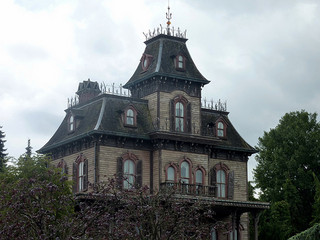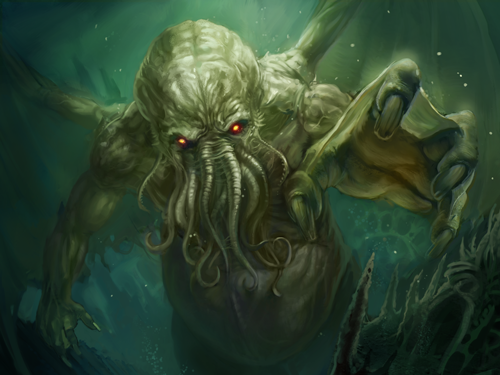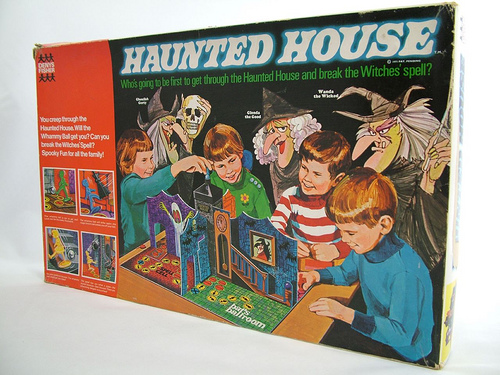You know what my favorite thing about Halloween is? Well, besides the candy. Any guesses?
It’s ok, I won’t drag this out. The answer is horror games and, to be honest, they’re also my favorite thing about gaming in general.
I’ve been a fan of the horror genre for as long as I can remember. While my mother was reading Stephen King, I was reading R. L. Stine; while my cousin was watching Jaws, I was…well, I was also watching Jaws. See, this is my point.
 It’s not the gore that draws me in, nor is it the dreary settings. It’s the psychology. There’s something about horror that taps into the core of our humanity and exposes us, flaws and strengths alike. Pure fear strips away our civilized behavior and leaves only our raw animal selves – the parts that we, as humans, try so hard to cover and control. We react to fear on instinct. Our stomachs drop. Our blood rushes to our legs and arms. We lose reason, and we think only in terms of fight, flight, or freeze. Our hearts pound rough rhythms in our chests. Danger is near, and we must survive.
It’s not the gore that draws me in, nor is it the dreary settings. It’s the psychology. There’s something about horror that taps into the core of our humanity and exposes us, flaws and strengths alike. Pure fear strips away our civilized behavior and leaves only our raw animal selves – the parts that we, as humans, try so hard to cover and control. We react to fear on instinct. Our stomachs drop. Our blood rushes to our legs and arms. We lose reason, and we think only in terms of fight, flight, or freeze. Our hearts pound rough rhythms in our chests. Danger is near, and we must survive.
No other genre provokes this reaction. Science fiction shows us what it is to be human through exploring alien worlds and cultures. Fantasy tells us stories of cultivating our best features through practice and work. Horror, though, strips everything away and shows us at our worst, our weakest. It taps into the dark places that we all have hidden in our minds, and it lets those fantasies breathe. It shows us what we are capable of. The result is not always good.
Most of the time in horror, the protagonist triumphs. Heroism and courage come about through facing our fears and pushing ahead through the darkness. Strength and happiness are earned in horror, never given.
On the other hand, sometimes the protagonist fails. Despite best efforts, nothing could be done. However, in horror, the hero always fails while trying. Effort doesn’t always equal success, but it sure gives you a better chance than apathy.
Horror tabletop games operate a little different than other permutations of the genre, though. A memorable horror movie chills you through what you see, and a quality horror novel plants just enough information in your brain to let your imagination take over. A good horror game attempts to play these tricks too, but it also gives the player agency in the story. Players don’t have to yell at the innocent young heroine not to open that door, and they don’t have to remind the eager party of campers not to split up.
Games like this don’t necessarily give you the chills the same way a particularly creepy film will, but they make up for it by giving you a chance to test your wits and to apply your logical gamer mind to a dire, life-or-death situation without ever actually being in danger.
That juxtaposition can be the most rewarding – but also the most frustrating – part of playing in or running a horror game. Horror runs on emotion. Fear bypasses our analytical front brain and taps straight into instinct. To achieve the same end in a game, however, you’d have to make gamers very freaked out to get them to agree to a foolish horror movie trope. Instead, they take the illogical and process it logically. They’ll react to a fear-inducing situation without fear, and what would (in real life) be a battle of speed, agility, or strength becomes a battle of wits.
Take Arkham Horror. In a real Cthonian invasion, I doubt you’ll hear people arguing about whether it’s better to close the gate at the Woods or at the Black Cave first. In reality, you’ll close whichever gate you can possibly get to because this is all really scary and you’re desperate. When the emotion is removed, though, you can analyze. You’re able to deduce that it’s better to close the cave because that location is more strategically important for this group of characters.

Ever so close…
Removing the emotion from horror strips away a portion of its effectiveness, and this is why I believe that horror board games, while fun, do not capture the essence of horror gaming. Escaping aliens in Level 7, a dangerous cultist in Mansions of Madness or the conspirator in Betrayal at House on the Hill are exciting and stressful situations, but they can lose something in translation if cold reason is used to make decisions instead of fear-induced ones. If horror isn’t actually scary, after all, can it even be called horror?
This is where RPGs comes in. With a roleplaying game (and a skilled GM), you can experience horror both as an emotion and as a puzzle. Here, you grow attached to your character, and threats to your creation become personal. You experience life in the game through that character, and you experience fear through them as well. While the emotion is not as strong as it would be were you to face the same situation in real life, the tension remains. The desperation remains. Something you care about is threatened, even if it is only a character you created. Horror RPGs force you to invest a part of yourself into the narrative, and so the fear rings true and captures you unlike in horror board game.
Add to this a good GM, one who is able to read you and play into your own fears, and a horror RPG is one of the purest expressions of the genre. It injects you into the story and lets you try your wits against the zombie horde or the psycho killer or the alien invaders, and it does so without losing the emotional heart of horror.
Of course, Arkham will always have a special place in my heart. It was my gateway game, and its rich narrative keeps me coming back. But for true horror gaming, the kind that gives me chills and keeps me up at night, I’m looking forward to some tabletop.
![]()
Erin Ryan is a regular contributor to the site, and a fan of all manner of things that go bump in the night. Feel free to share your thoughts with us over on our social media pages!
Photo Credits: Spooky House by Sean MacEntee; Haunted House Game by Steve Berry; Cthulhu by Fantasy Flight Games.

